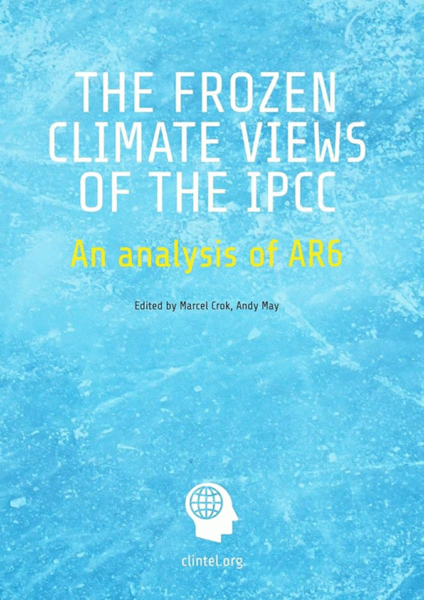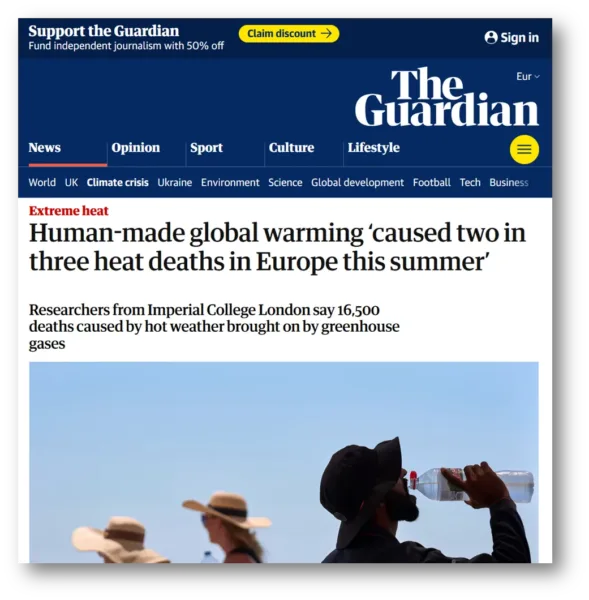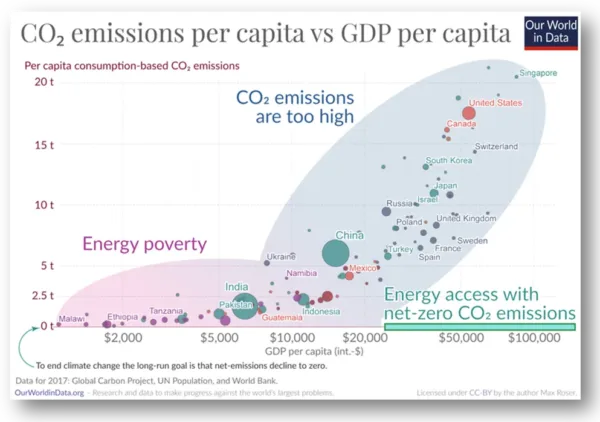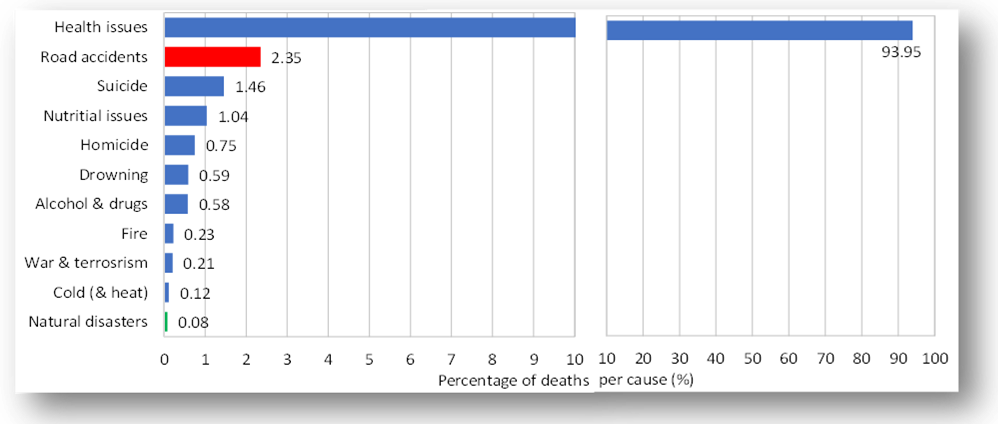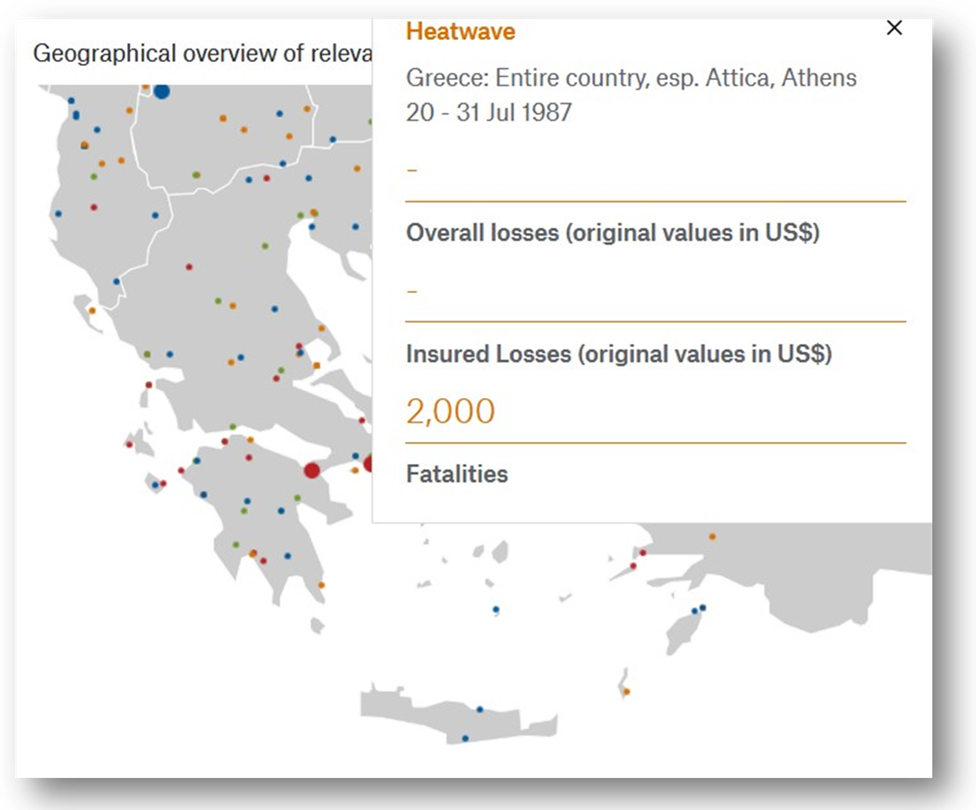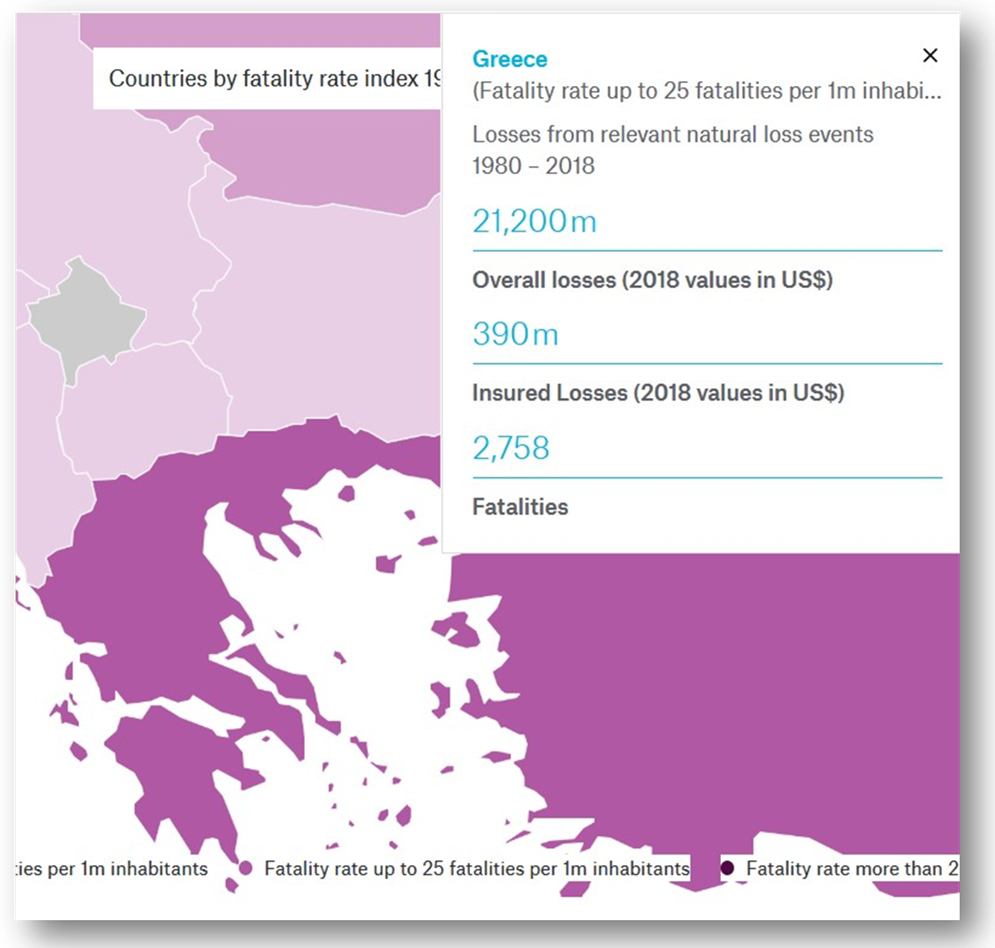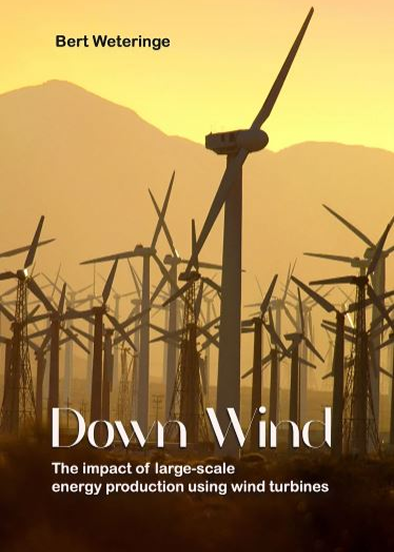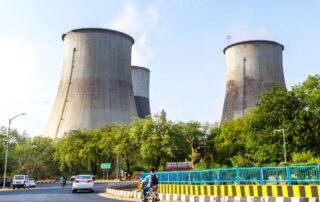Are we going to die from climate change?
More summer heat deaths in 854 European cities, screams a recent ‘study’. Greek hydrologist Demetris Koutsoyiannis debunks this most recent lie of what he calls the climalarmists. “Why did the authors not wait for the “actual 2025 death counts” before studying these?”
“Yes, of course we’ll die from climate change,” most climalarmists would say in answer to my question. Yet some have started to doubt. As a characteristic example, Hannah Ritchie changed her perspective, as reported in The Guardian last year: “I thought most of us were going to die from the climate crisis. I was wrong”. She now believes that we’ll die from environmental issues, particularly air pollution, as these are currently far deadlier. I don’t know if she still insists that her “goal in the next few decades is to get as many countries in the green rectangle as possible” and if achieving this would speed up or slow down our demise. Here I refer to a graph reproduced from her X post, in which she assumes that we will have plenty of energy (and hence lots of money)1Cf. Fig. 7 in G.-F. Sargentis, and D. Koutsoyiannis, The function of money in water–energy–food and land nexus, Land, 12 (3), 669, doi: 10.3390/land12030669, 2023. without carbon emissions.
Coming back to The Guardian’s perspective of our death, it appears to suggest that dying from climate change is already a reality. An article published by this newspaper the other day informed us that there were lots of heat-related deaths in Europe this summer, two thirds of which were due to human-made global warming.
Of course, this “news” was widely reproduced in other European countries. For example, the Greek newspaper Kathimerini reports: “Athens among cities with rising heat deaths”. It provides further details, such as:
In Greece, 808 deaths were recorded, including 630 in Athens alone. Researchers said Rome, Athens and Bucharest had the highest excess mortality rates among European capitals. “The main reason Athens ranks second is the high temperatures observed this year,” said Garyfallos Konstantinoudis, lecturer in biostatistics and epidemiology at Imperial College London.
From the outset, I could see that all of this was a lie, which is why I am writing this note2Cf. my earlier post: On Truth and Freedom Demetris Koutsoyiannis 6 sep Read full story. It was easy for me to spot that it was a lie, as I know that:
- The general trend in the number of deaths caused by all natural hazards is decreasing3See chapter 11 in my book: Stochastics of Hydroclimatic Extremes – A Cool Look at Risk.Update 2025-09-21: I am copying here from my book its Figure 11.15, showing the average share of deaths per cause in the 2010s using data from Our World in Data.
- The vast majority of deaths related to extreme temperatures are due to cold rather than heat. Specifically, a multi-country analysis by Gasparrini et al. (2015)4Gasparrini, A., Guo, Y., Hashizume, M., Lavigne, E., Zanobetti, A., Schwartz, J., Tobias, A., Tong, S., Rocklöv, J., Forsberg, B., and Leone, M., 2015. Mortality risk attributable to high and low ambient temperature: a multicountry observational study. The Lancet, 386 (9991), 369-375.suggests that deaths of this type are due to cold at 95%. A more recent study by Zhao et al. (2021)5Zhao, Q., Guo, Y., Ye, T., Gasparrini, A., Tong, S., Overcenco, A., Urban, A., Schneider, A., Entezari, A., VicedoCabrera, A.M. and Zanobetti, A., 2021. Global, regional, and national burden of mortality associated with non-optimal ambient temperatures from 2000 to 2019: a three-stage modelling study. The Lancet Planetary Health, 5(7), e415-e425.estimated that the percentage of deaths from cold is more than 90% of the total.
- It’s too early to have reliable, recorded data of deaths for the last summer—let alone information on their cause. I have searched for mortality data several times, and have always found it difficult to locate recent data. Thus, I am confident that statements such as “808 deaths were recorded” can only be lies.
- The record number of deaths in Greece due to any natural hazard occurred in 1987 (with 2000 fatalities in Athens in this single event, out of 2758 total fatalities from natural loss events in the entire period of data, 1980-2018, and for the entire Greece)6The figures I give originate from Munich Re’s database, part of which was publicly available some years ago. Indeed, there was an application with which one could browse that part of the database. However, later they cut the public availability (they replaced the application with “Please contact us”). But I had saved the following screenshots from their application, which back the data I give
. The second-highest number of deaths occurred in 1958 (with 600 fatalities, mostly in Thessaly)7The source for this event, which was not covered by Munich Re database, is Wikipedia.. I live in Athens and am not aware of any major heatwave-related mass fatalities in the 21st century. Hence, “rising heat deaths” can only be a lie.
One may counter that the above “news” articles are backed by “science”, namely the following study by the renowned Imperial College London. The Guardian’s article provides a link to the study, whose front cover is the following.
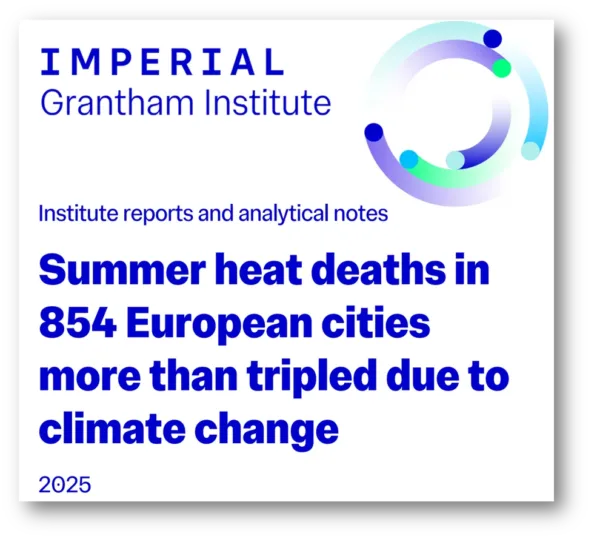
I wouldn’t call this report “science”. I usually use the term “sophistry” for such type of reports, but I don’t even think this one deserves that characterisation. I did not read it, as I cannot afford to read this type of reports that are designed to instil fear. I just browsed it to see the mortality data it used. I understood that it is not based on real-world data, but on the virtual reality constructed by models. To confirm my suspicions, I asked Grok (an AI bot built by xAI) to read it—and indeed, unlike me, Grok is not at all reluctant to read nonsensical reports. Here is our dialogue:
DK: Could you have a look at the attached document and check whether or not the authors used real-world data of deaths in the period they examined?
Grok: No, the authors did not use real-world data of deaths from the period examined (summer 2025). Instead, they relied on historical mortality data up to 2019, combined with established epidemiological models and exposure-response functions, to estimate expected heat-related deaths. This is explicitly stated in the document, noting that actual 2025 death counts were not available at the time of writing, so a constant baseline mortality rate derived from historical data was projected forward for their calculations.
Why did the authors not wait for the “actual 2025 death counts” before studying these? Why did they publish their report without sending it to peer preview? Why did they study deaths from heat and not deaths from the deadlier cold? Well, the religious aspect of the climalarkey needs to be associated with “hell”. In this respect, heat serves better than cold for the popular slogans of “climate apocalypse”, “climate existential threat”, “global boiling”, “global burning”, etc.
But perhaps this type of scaremongering is already obsolete. The World Economic Forum, which coordinates the agenda, may have already changed the perspective from “climate crisis” to “water crisis”. The reasons are explained in its following “Press Conference: The New Economics of Water – Launch of Global Commission | Davos | #WEF22”.
Here is a small part of WEF’s (and UCL’s) Mariana Mazzucato’s talk, transcribed from the video.
Did we actually manage to vaccinate everyone in the world? No. So highlighting water as a global commons and what it means to work together and see it both out of that kind of global commons perspective but also the self-interest perspective, because it does have that parallel. It’s not only important, but it’s also important because we haven’t managed to solve those problems but which had similar attributes. And water is something that people understand.
You know, climate change is a bit abstract. Some people understand it really well, some understand it a bit, some just don’t understand it. Water—every kid knows how important it is to have water when you’re playing football and you’re thirsty, you need water.
Will my fellow hydrologists benefit (e.g. in terms of money and glory) from the emerging change of perspective from “climate crisis” to “water crisis”? I doubt—unless they fully disengage from science.
Merchants of the death fear are not interested in supporting scientists, nor do they care about real scientific expertise. They would rather fund those who promote their agenda.
Merchants of the death fear do not want to save us from death. Rather, they prefer us dead, in order to “solve” the “overpopulation” problem, as well as their own financial problems.
This particularly concerns us older people. From our death, their benefit would be double. They will get rid of people with life experience, who are sceptical of the current state of affairs. And they will improve the economy, given that the social welfare for elderly (pension, health and disability insurance) is ‘no longer sustainable’ and, according to the German Chancellor Friedrich Merz8 “In Germany, social welfare is ‘no longer sustainable’“, Le Monde, 12 September 2025., needs reform.
Footnote listing:
- 1
- 2Cf. my earlier post: On Truth and Freedom Demetris Koutsoyiannis 6 sep Read full story
- 3See chapter 11 in my book: Stochastics of Hydroclimatic Extremes – A Cool Look at Risk.Update 2025-09-21: I am copying here from my book its Figure 11.15, showing the average share of deaths per cause in the 2010s using data from Our World in Data.
- 4Gasparrini, A., Guo, Y., Hashizume, M., Lavigne, E., Zanobetti, A., Schwartz, J., Tobias, A., Tong, S., Rocklöv, J., Forsberg, B., and Leone, M., 2015. Mortality risk attributable to high and low ambient temperature: a multicountry observational study. The Lancet, 386 (9991), 369-375.
- 5Zhao, Q., Guo, Y., Ye, T., Gasparrini, A., Tong, S., Overcenco, A., Urban, A., Schneider, A., Entezari, A., VicedoCabrera, A.M. and Zanobetti, A., 2021. Global, regional, and national burden of mortality associated with non-optimal ambient temperatures from 2000 to 2019: a three-stage modelling study. The Lancet Planetary Health, 5(7), e415-e425.
- 6The figures I give originate from Munich Re’s database, part of which was publicly available some years ago. Indeed, there was an application with which one could browse that part of the database. However, later they cut the public availability (they replaced the application with “Please contact us”). But I had saved the following screenshots from their application, which back the data I give
- 7The source for this event, which was not covered by Munich Re database, is Wikipedia.
- 8
more news
Clearing up some misconceptions about the DoE report
After environmental groups sued to halt a critical Department of Energy climate report, accusations of secrecy and political bias quickly followed. Ross McKitrick responds by challenging what he calls widespread misconceptions about the project, defending its transparency, scientific grounding and editorial independence.
India Builds a ‘Fossil Future’
While Western governments continue to speak the language of net zero, India is rapidly expanding coal, oil and natural gas production to secure long-term energy security and economic growth. By strengthening hydrocarbon trade with the United States and other partners, India is building what the author calls a “fossil future,” prioritizing reliable and affordable energy over climate pledges.
Interview with Dr. Guus Berkhout: A Different Perspective on Climate Science and Energy Policy
The big problem today is that climate models are not fit-for-purpose, says Clintel co-founder dr. Guus Berkhout. They do not reflect the real world. That is the reason why the Net Zero policy does not work. We need fundamental changes in climate science and climate policies. We now see that this message gets more and more support.
- 1
- 2Cf. my earlier post: On Truth and Freedom Demetris Koutsoyiannis 6 sep Read full story
- 3See chapter 11 in my book: Stochastics of Hydroclimatic Extremes – A Cool Look at Risk.Update 2025-09-21: I am copying here from my book its Figure 11.15, showing the average share of deaths per cause in the 2010s using data from Our World in Data.
- 4Gasparrini, A., Guo, Y., Hashizume, M., Lavigne, E., Zanobetti, A., Schwartz, J., Tobias, A., Tong, S., Rocklöv, J., Forsberg, B., and Leone, M., 2015. Mortality risk attributable to high and low ambient temperature: a multicountry observational study. The Lancet, 386 (9991), 369-375.
- 5Zhao, Q., Guo, Y., Ye, T., Gasparrini, A., Tong, S., Overcenco, A., Urban, A., Schneider, A., Entezari, A., VicedoCabrera, A.M. and Zanobetti, A., 2021. Global, regional, and national burden of mortality associated with non-optimal ambient temperatures from 2000 to 2019: a three-stage modelling study. The Lancet Planetary Health, 5(7), e415-e425.
- 6The figures I give originate from Munich Re’s database, part of which was publicly available some years ago. Indeed, there was an application with which one could browse that part of the database. However, later they cut the public availability (they replaced the application with “Please contact us”). But I had saved the following screenshots from their application, which back the data I give
- 7The source for this event, which was not covered by Munich Re database, is Wikipedia.
- 8
